Module 10 Unit 3 外研版初中英语八年级下
文档属性
| 名称 | Module 10 Unit 3 外研版初中英语八年级下 | 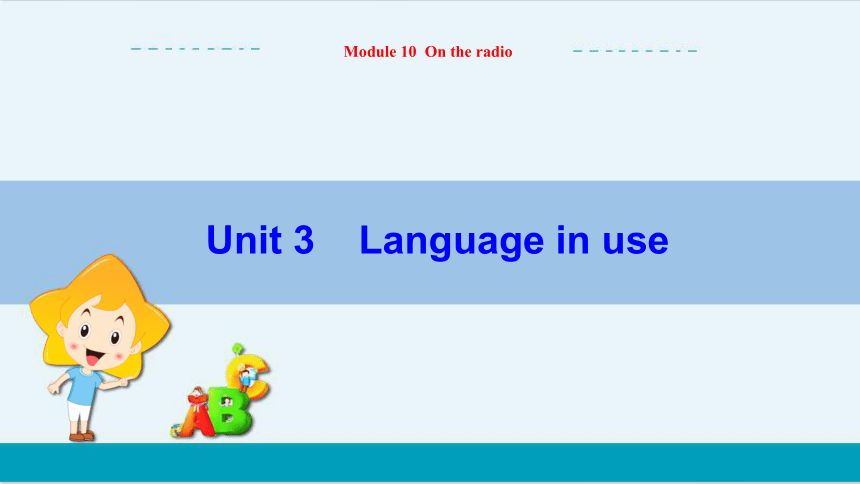 | |
| 格式 | pptx | ||
| 文件大小 | 3.4MB | ||
| 资源类型 | 试卷 | ||
| 版本资源 | 外研版 | ||
| 科目 | 英语 | ||
| 更新时间 | 2024-02-21 19:33:46 | ||
图片预览

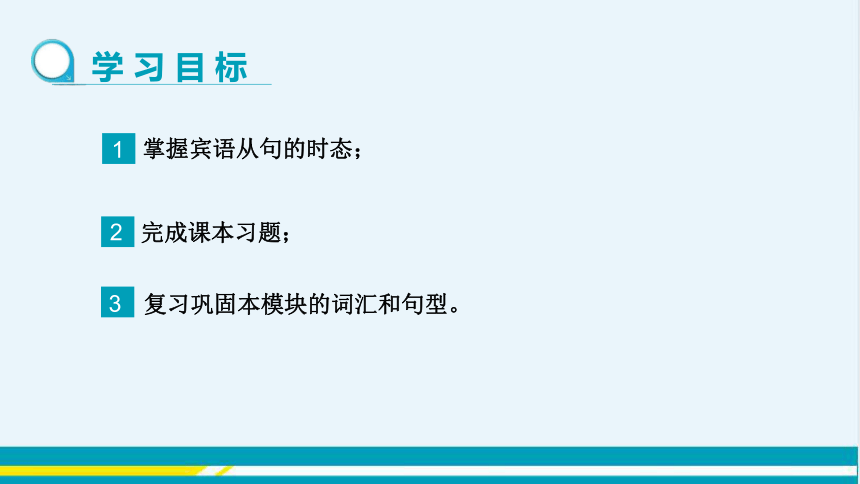

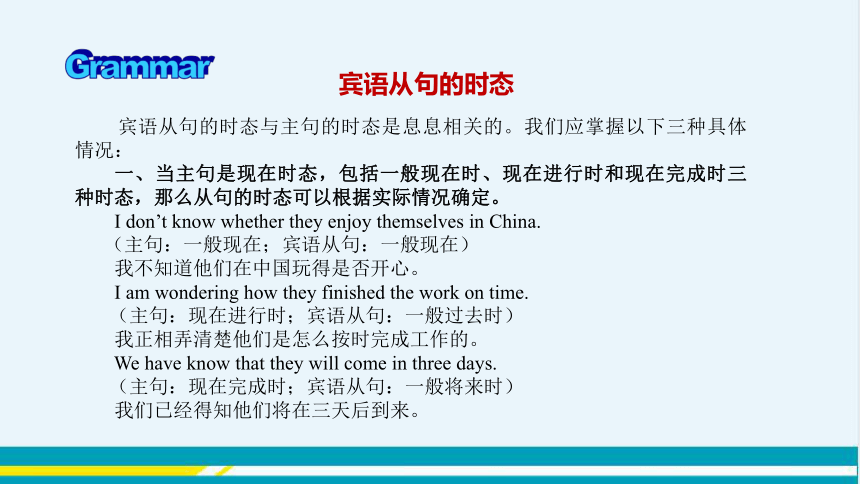
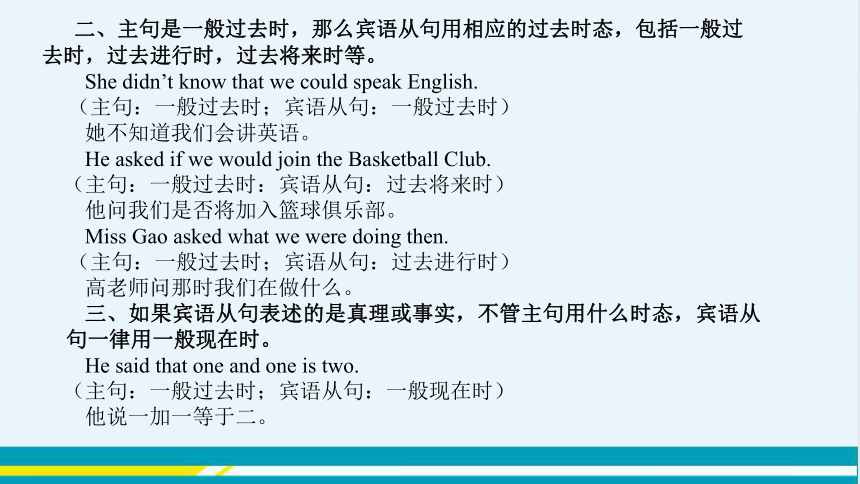
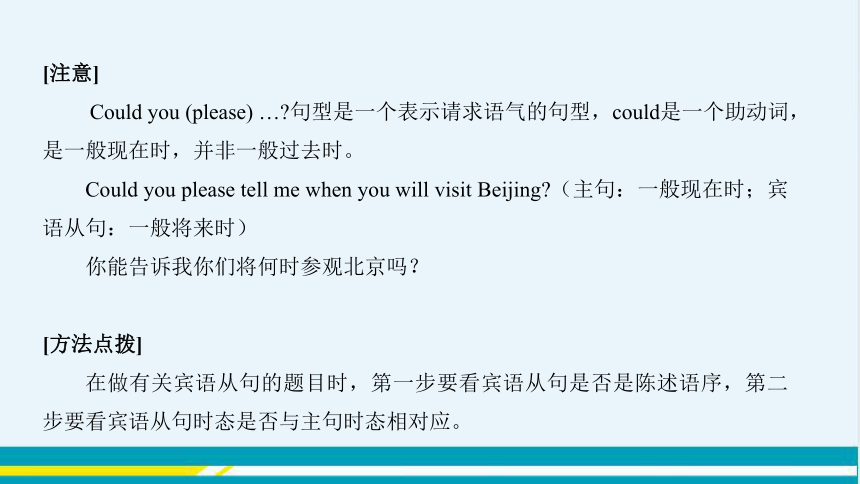
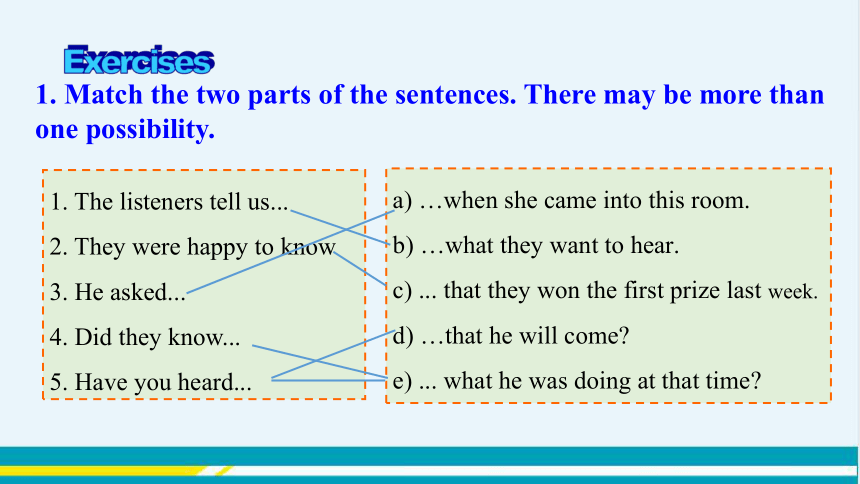
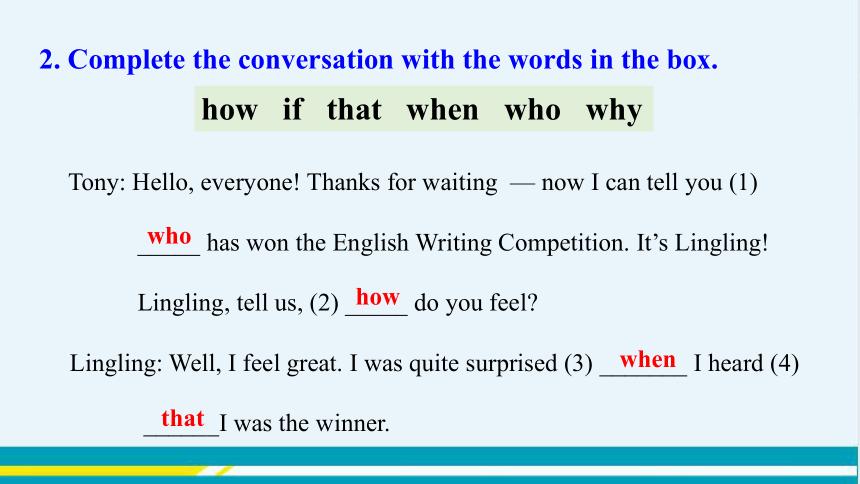
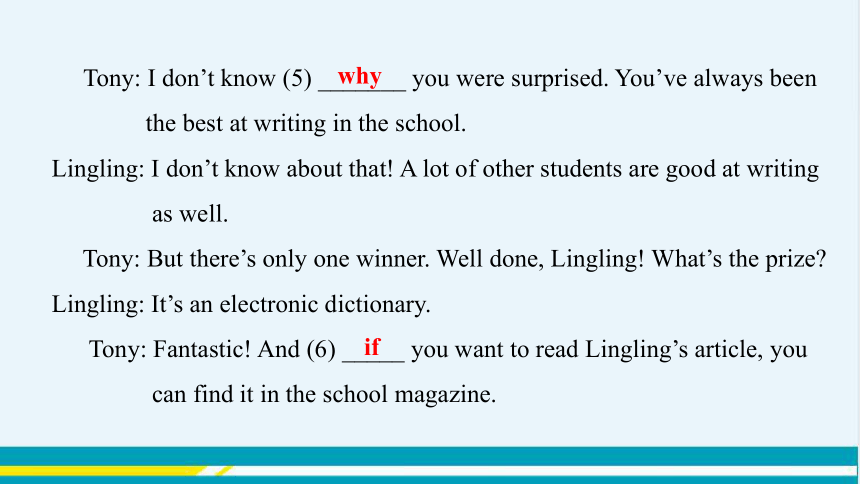
文档简介
(共25张PPT)
Unit 3 Language in use
Module 10 On the radio
学 习 目 标
掌握宾语从句的时态;
1
3
复习巩固本模块的词汇和句型。
完成课本习题;
2
新学新练
I hope that you can join us one day.
When it’s on, it means we’re on air.
It seemed that they were speaking to me in person.
Just tell me what you had for breakfast.
Language practice
Grammar
宾语从句的时态
宾语从句的时态与主句的时态是息息相关的。我们应掌握以下三种具体情况:
一、当主句是现在时态,包括一般现在时、现在进行时和现在完成时三种时态,那么从句的时态可以根据实际情况确定。
I don’t know whether they enjoy themselves in China.
(主句:一般现在;宾语从句:一般现在)
我不知道他们在中国玩得是否开心。
I am wondering how they finished the work on time.
(主句:现在进行时;宾语从句:一般过去时)
我正相弄清楚他们是怎么按时完成工作的。
We have know that they will come in three days.
(主句:现在完成时;宾语从句:一般将来时)
我们已经得知他们将在三天后到来。
二、主句是一般过去时,那么宾语从句用相应的过去时态,包括一般过
去时,过去进行时,过去将来时等。
She didn’t know that we could speak English.
(主句:一般过去时;宾语从句:一般过去时)
她不知道我们会讲英语。
He asked if we would join the Basketball Club.
(主句:一般过去时:宾语从句:过去将来时)
他问我们是否将加入篮球俱乐部。
Miss Gao asked what we were doing then.
(主句:一般过去时;宾语从句:过去进行时)
高老师问那时我们在做什么。
三、如果宾语从句表述的是真理或事实,不管主句用什么时态,宾语从句一律用一般现在时。
He said that one and one is two.
(主句:一般过去时;宾语从句:一般现在时)
他说一加一等于二。
[注意]
Could you (please) … 句型是一个表示请求语气的句型,could是一个助动词,是一般现在时,并非一般过去时。
Could you please tell me when you will visit Beijing (主句:一般现在时;宾语从句:一般将来时)
你能告诉我你们将何时参观北京吗?
[方法点拨]
在做有关宾语从句的题目时,第一步要看宾语从句是否是陈述语序,第二步要看宾语从句时态是否与主句时态相对应。
1. Match the two parts of the sentences. There may be more than one possibility.
1. The listeners tell us...
2. They were happy to know
3. He asked...
4. Did they know...
5. Have you heard...
a) …when she came into this room.
b) …what they want to hear.
c) ... that they won the first prize last week.
d) …that he will come
e) ... what he was doing at that time
Exercises
Tony: Hello, everyone! Thanks for waiting — now I can tell you (1)
_____ has won the English Writing Competition. It’s Lingling!
Lingling, tell us, (2) _____ do you feel
Lingling: Well, I feel great. I was quite surprised (3) _______ I heard (4)
______I was the winner.
2. Complete the conversation with the words in the box.
how if that when who why
who
how
when
that
Tony: I don’t know (5) _______ you were surprised. You’ve always been
the best at writing in the school.
Lingling: I don’t know about that! A lot of other students are good at writing
as well.
Tony: But there’s only one winner. Well done, Lingling! What’s the prize
Lingling: It’s an electronic dictionary.
Tony: Fantastic! And (6) _____ you want to read Lingling’s article, you
can find it in the school magazine.
why
if
18th May Saturday
I have heard that Lingling (1)___________________________________. Tony said (2) __________________________ at the news in the beginning. I know (3) ___________________ an electronic dictionary, and I think (4) ________________ fantastic. I have decided (5) _________________________________. Then maybe next time I will write an article for the competition.
3. Read the conversation in Activity 2 again and complete Daming’s diary.
has won the English Writing Competition
(that) she was quite surprised
(that) the prize is/was
that’s/ (that) it’s
that I will practise my English writing
4. Complete the passage with the correct form of the expressions in the box.
I am going to (1) __________________the radio station. When the red light is on, it means we (2) ___________. You have to avoid (3)______________. I know some of you would like to work in radio. I will introduce you to the presenters. They will talk to you (4) _________. This screen shows us what is happening in the world. The first programme of the day starts at 5 am, and the station closes down at 12 pm. OK, that is (5)____________ the tour. Has anyone got any questions
be on air in person make noise show you around the end of
show you around
are on air
making noise
in person
the end of
5. Listen and say what Kate’s job is.
a) A newspaper reporter.
b) A radio presenter.
c) A newsreader
√
6. Listen again and complete Kate's timetable.
10 am Kate ______ in a park.
11 am
4 pm The programme ______.
In the first part of the show, Kate ______________ her guests.
Then the ________________ comes in. This takes about
_______ minutes.
After that is the ______________.
Finally listeners ________ the station and ________ Kate.
7:30 pm The programme _______.
runs
Kate listens to the latest news on the radio.
starts
interviews
newsreader
five
weather report
phone
talk to
finishes
__________________________________________________________
7. Read the interview and complete the notes.
John: It’s really nice of you to agree to talk to us, Bernard. I know
you’re very busy.
Bernard: I’m very happy to talk to you. I enjoyed my time at
school — it was a good school.
John: It still is. I’m very happy there.
Bernard: So you present programmes for the school radio station
John: Yes, and we want you to tell us about your work as a
presenter for a popular radio programme. We want to know
how you’ve become so successful.
It + be +形容词+of sb.+to do sth.句型,意为“某人做某事是……的”
Bernard: Well, to become successful, you need to work hard, you know.
And I’ve always worked very hard. It's also important to love
your job, and I’ve loved radio since I was quite young.
John: How old were you when you decided you wanted to work in
radio
Bernard: I started presenting music shows for the school radio when I
was fifteen. I became the youngest presenter of a popular
national teenage radio show when I was seventeen. And then,
when I went to university, I worked on the university radio
station in my free time. Alter that, it was easy to get a job
with a local radio station in a small town. And after
about two
动词不定式短语作目的状语,前置。
years, a national radio station asked me to work for them. I’ve
worked for them for four years now.
John: It sounds very easy when you talk about it.
Bernard: It was quite easy, really. If you’re very interested in something,
you usually want to be good at it. You’ll keep on practising and
you’ll be successful.
John: Thanks. I’ll remember that.
keep on doing sth.意为“持续做某事”
Experiences
At fifteen years old, Bernard started to __________________.
At seventeen years old, Bernard became the (2)_________
presenter of a teenage radio show.
He has worked for a national radio station for (3)_____ years
now.
Opinions
To become successful, you need to (4)__________.
It is also important to (5)____________.
present music show
youngest
four
work hard
love your job
The clockwork radio
Trevor Baylis, a British inventor, was listening to a radio programme about health problems in Africa one day. He then realised how much a radio could help African people learn about health and health
Around the world
care. Electricity and batteries are expensive and hard to get in some parts of Africa, so he developed a clever radio that works without batteries or electricity. The clockwork or wind-up radio, first made in South Africa in the 1990s, changed the lives of many African people. Even in tiny villages which had no electricity or other forms of communication, people began to listen to the radio, not only for entertainment, but to educate themselves too.
not only…but (also)意为“不但……而且……”
News
Music
Stories
Interviews
Phone-ins
Weather reports
8. Work in pairs. Decide what to include in your school radio programme.
Module task: Making a school radio programme
9. Write each section of the programme.
Decide who will write each section.
Write the reports and show them in your group.
10. Do your school radio programme. Try to record it if possible
11. Present your radio programme to the rest of the class.
Mrs Black wanted to know ________.
A. whose pen it is B. whose pen it was
C. whose pen is it D. whose pen was it
2. ---Could you please tell me ________
--- Next Monday.
A. when did your mother return home
B. when will your mother return home
C. when your mother will return home
D. when your mother returned home
单项填空
B
课 堂 达 标
C
3. My younger sister asked me __________.
A. whether I would go to Mary’s birthday party
B. whether would I go to the zoo with her
C. How did I get so many nice stamps
D. whether I have been to Beijing
4. Peter told me that Paris ______ the capital of France.
A. is B. was C. will be D. would be
5. --- Have you found out ________
--- Yes. Half an hour ago.
A. where does he live B. where he lives
C. when did they leave D. when they left
A
A
D
Go over what you’ve learnt in Unit 3.
Homework
Thank you !
Unit 3 Language in use
Module 10 On the radio
学 习 目 标
掌握宾语从句的时态;
1
3
复习巩固本模块的词汇和句型。
完成课本习题;
2
新学新练
I hope that you can join us one day.
When it’s on, it means we’re on air.
It seemed that they were speaking to me in person.
Just tell me what you had for breakfast.
Language practice
Grammar
宾语从句的时态
宾语从句的时态与主句的时态是息息相关的。我们应掌握以下三种具体情况:
一、当主句是现在时态,包括一般现在时、现在进行时和现在完成时三种时态,那么从句的时态可以根据实际情况确定。
I don’t know whether they enjoy themselves in China.
(主句:一般现在;宾语从句:一般现在)
我不知道他们在中国玩得是否开心。
I am wondering how they finished the work on time.
(主句:现在进行时;宾语从句:一般过去时)
我正相弄清楚他们是怎么按时完成工作的。
We have know that they will come in three days.
(主句:现在完成时;宾语从句:一般将来时)
我们已经得知他们将在三天后到来。
二、主句是一般过去时,那么宾语从句用相应的过去时态,包括一般过
去时,过去进行时,过去将来时等。
She didn’t know that we could speak English.
(主句:一般过去时;宾语从句:一般过去时)
她不知道我们会讲英语。
He asked if we would join the Basketball Club.
(主句:一般过去时:宾语从句:过去将来时)
他问我们是否将加入篮球俱乐部。
Miss Gao asked what we were doing then.
(主句:一般过去时;宾语从句:过去进行时)
高老师问那时我们在做什么。
三、如果宾语从句表述的是真理或事实,不管主句用什么时态,宾语从句一律用一般现在时。
He said that one and one is two.
(主句:一般过去时;宾语从句:一般现在时)
他说一加一等于二。
[注意]
Could you (please) … 句型是一个表示请求语气的句型,could是一个助动词,是一般现在时,并非一般过去时。
Could you please tell me when you will visit Beijing (主句:一般现在时;宾语从句:一般将来时)
你能告诉我你们将何时参观北京吗?
[方法点拨]
在做有关宾语从句的题目时,第一步要看宾语从句是否是陈述语序,第二步要看宾语从句时态是否与主句时态相对应。
1. Match the two parts of the sentences. There may be more than one possibility.
1. The listeners tell us...
2. They were happy to know
3. He asked...
4. Did they know...
5. Have you heard...
a) …when she came into this room.
b) …what they want to hear.
c) ... that they won the first prize last week.
d) …that he will come
e) ... what he was doing at that time
Exercises
Tony: Hello, everyone! Thanks for waiting — now I can tell you (1)
_____ has won the English Writing Competition. It’s Lingling!
Lingling, tell us, (2) _____ do you feel
Lingling: Well, I feel great. I was quite surprised (3) _______ I heard (4)
______I was the winner.
2. Complete the conversation with the words in the box.
how if that when who why
who
how
when
that
Tony: I don’t know (5) _______ you were surprised. You’ve always been
the best at writing in the school.
Lingling: I don’t know about that! A lot of other students are good at writing
as well.
Tony: But there’s only one winner. Well done, Lingling! What’s the prize
Lingling: It’s an electronic dictionary.
Tony: Fantastic! And (6) _____ you want to read Lingling’s article, you
can find it in the school magazine.
why
if
18th May Saturday
I have heard that Lingling (1)___________________________________. Tony said (2) __________________________ at the news in the beginning. I know (3) ___________________ an electronic dictionary, and I think (4) ________________ fantastic. I have decided (5) _________________________________. Then maybe next time I will write an article for the competition.
3. Read the conversation in Activity 2 again and complete Daming’s diary.
has won the English Writing Competition
(that) she was quite surprised
(that) the prize is/was
that’s/ (that) it’s
that I will practise my English writing
4. Complete the passage with the correct form of the expressions in the box.
I am going to (1) __________________the radio station. When the red light is on, it means we (2) ___________. You have to avoid (3)______________. I know some of you would like to work in radio. I will introduce you to the presenters. They will talk to you (4) _________. This screen shows us what is happening in the world. The first programme of the day starts at 5 am, and the station closes down at 12 pm. OK, that is (5)____________ the tour. Has anyone got any questions
be on air in person make noise show you around the end of
show you around
are on air
making noise
in person
the end of
5. Listen and say what Kate’s job is.
a) A newspaper reporter.
b) A radio presenter.
c) A newsreader
√
6. Listen again and complete Kate's timetable.
10 am Kate ______ in a park.
11 am
4 pm The programme ______.
In the first part of the show, Kate ______________ her guests.
Then the ________________ comes in. This takes about
_______ minutes.
After that is the ______________.
Finally listeners ________ the station and ________ Kate.
7:30 pm The programme _______.
runs
Kate listens to the latest news on the radio.
starts
interviews
newsreader
five
weather report
phone
talk to
finishes
__________________________________________________________
7. Read the interview and complete the notes.
John: It’s really nice of you to agree to talk to us, Bernard. I know
you’re very busy.
Bernard: I’m very happy to talk to you. I enjoyed my time at
school — it was a good school.
John: It still is. I’m very happy there.
Bernard: So you present programmes for the school radio station
John: Yes, and we want you to tell us about your work as a
presenter for a popular radio programme. We want to know
how you’ve become so successful.
It + be +形容词+of sb.+to do sth.句型,意为“某人做某事是……的”
Bernard: Well, to become successful, you need to work hard, you know.
And I’ve always worked very hard. It's also important to love
your job, and I’ve loved radio since I was quite young.
John: How old were you when you decided you wanted to work in
radio
Bernard: I started presenting music shows for the school radio when I
was fifteen. I became the youngest presenter of a popular
national teenage radio show when I was seventeen. And then,
when I went to university, I worked on the university radio
station in my free time. Alter that, it was easy to get a job
with a local radio station in a small town. And after
about two
动词不定式短语作目的状语,前置。
years, a national radio station asked me to work for them. I’ve
worked for them for four years now.
John: It sounds very easy when you talk about it.
Bernard: It was quite easy, really. If you’re very interested in something,
you usually want to be good at it. You’ll keep on practising and
you’ll be successful.
John: Thanks. I’ll remember that.
keep on doing sth.意为“持续做某事”
Experiences
At fifteen years old, Bernard started to __________________.
At seventeen years old, Bernard became the (2)_________
presenter of a teenage radio show.
He has worked for a national radio station for (3)_____ years
now.
Opinions
To become successful, you need to (4)__________.
It is also important to (5)____________.
present music show
youngest
four
work hard
love your job
The clockwork radio
Trevor Baylis, a British inventor, was listening to a radio programme about health problems in Africa one day. He then realised how much a radio could help African people learn about health and health
Around the world
care. Electricity and batteries are expensive and hard to get in some parts of Africa, so he developed a clever radio that works without batteries or electricity. The clockwork or wind-up radio, first made in South Africa in the 1990s, changed the lives of many African people. Even in tiny villages which had no electricity or other forms of communication, people began to listen to the radio, not only for entertainment, but to educate themselves too.
not only…but (also)意为“不但……而且……”
News
Music
Stories
Interviews
Phone-ins
Weather reports
8. Work in pairs. Decide what to include in your school radio programme.
Module task: Making a school radio programme
9. Write each section of the programme.
Decide who will write each section.
Write the reports and show them in your group.
10. Do your school radio programme. Try to record it if possible
11. Present your radio programme to the rest of the class.
Mrs Black wanted to know ________.
A. whose pen it is B. whose pen it was
C. whose pen is it D. whose pen was it
2. ---Could you please tell me ________
--- Next Monday.
A. when did your mother return home
B. when will your mother return home
C. when your mother will return home
D. when your mother returned home
单项填空
B
课 堂 达 标
C
3. My younger sister asked me __________.
A. whether I would go to Mary’s birthday party
B. whether would I go to the zoo with her
C. How did I get so many nice stamps
D. whether I have been to Beijing
4. Peter told me that Paris ______ the capital of France.
A. is B. was C. will be D. would be
5. --- Have you found out ________
--- Yes. Half an hour ago.
A. where does he live B. where he lives
C. when did they leave D. when they left
A
A
D
Go over what you’ve learnt in Unit 3.
Homework
Thank you !
同课章节目录
- Module 1 Feelings and impressions
- Unit 1 It smells delicious.
- Unit 2 I feel nervous when I speak Chinese .
- Unit 3 Language in use
- Module 2 Experiences
- Unit 1 I've also entered lots of speaking competi
- Unit 2 They have seen the Pyramids.
- Unit 3 Language in use
- Module 3 Journey to space
- Unit 1 Has it arrived yet?
- Unit 2 We have not found life on any other planet
- Unit 3 Language in use
- Module 4 Seeing the docto
- Unit 1 I haven't done much exercise since I got m
- Unit 2 We have played football for a year now
- Unit 3 Language in use
- Module 5 Cartoons
- Unit 1 It's time to watch a cartoon.
- Unit 2 Tintin has been popular for over eighty yea
- Unit 3 Language in use
- Revision module A
- Module 6 Hobbies
- Unit 1 Do you collect anything ?
- Unit 2 Hobbies can make you grow as a person.
- Unit 3 Language in use
- Module 7 Summer in Los Angeles
- Unit 1 Please write to me and send me some photos
- Unit 2 Fill out a form and come to learn English
- Unit 3 Language in use
- Module 8 Time off
- Unit 1 I can hardly believe we are in the city ce
- Unit 2 We thought somebody was moving about
- Unit 3 Language in use
- Module 9 Friendship
- Unit 1 Could I ask if you've mentioned this to he
- Unit 2 I believe that the world is what you think
- Unit 3 Language in use
- Module 10 On the radio
- Unit 1 I hope that you can join us one day
- Unit 2 It seemed that they were speaking to me in
- Unit 3 Language in use
- Revision module B
